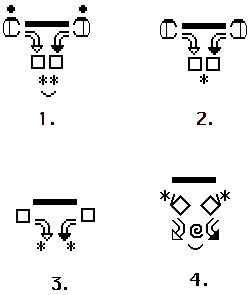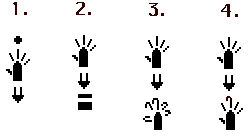|
SignWriting
List
January 27, 2000
QUESTION 0010:
When do I write the dark dots for "closing the fist?
And when are they not necessary?
ANSWER 0010:
Example 0010 shows a sign, giving lots of information
for the reader. Number 1 is the way it was written in
the original document. Number 2 is my version of the same
sign.
In Number 1,
the writer gave added information of the "dark dots"
which mean that the fingers "squeeze or bend at the
middle joint". Since the finishing position is written,
the reader can assume that the fingers "squeeze into
a fist", and writing the dots is a "double-up"
of information. It can be read without the dots.
The ending
position in Number 1 has two Touch symbols. I was not
sure if the writer meant that the hands touch each other
twice or not. If they really do "Touch-Touch"
then the double Touch symbols are necessary. |
EXAMPLES
0010

In my version,
Number 2, I placed a single Touch symbol, because I suspect
the Touch only occurs once, although I am guessing....
The main thing
to realize is that the dots usually are written when we
don't feel like writing the second position of a sign...so
when you choose to write the second position, they are
not really needed. |
| SignWriting
List
January 27, 2000
QUESTION
0011:
When do I write the dark dots for "closing the fist?
And when are they not necessary?
ANSWER 0011:
Number 1 in the attached file was the way the
sign was written in the original document. There is nothing
wrong with the sign...it is written with the assumption
that the reader knows the language. So I have written
three other possible signs to the right...all of them
showing how a foreigner could interpret the assumptions....
1.
The original sign shows the five handshape, palm to floor,
with a "squeeze motion", a bend from the middle
joint.
2.
It could mean this: The squeeze motion could finish in
a fist. |
EXAMPLES
0011

3. It could
mean this: The squeeze motion could finish with a claw...all
five fingers bent at the middle joint.
4. It could
mean this: The squeeze motion only for the middle finger
where the dot was located.
So you can
see that the dots "assume knowledge", and just
as long as the writer realizes that others will have to
guess as to how the sign finishes, it is OK.
To avoid guessing,
write the second position of course!
Valerie
Sutton
Sutton@SignWriting.org
|





































































